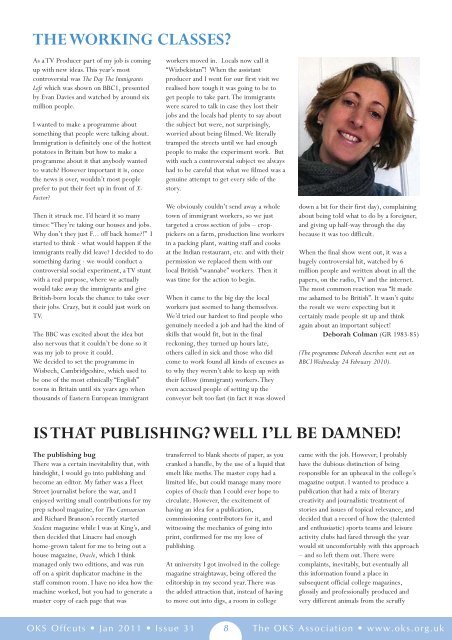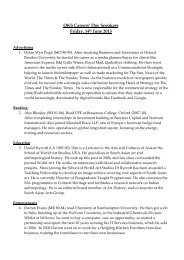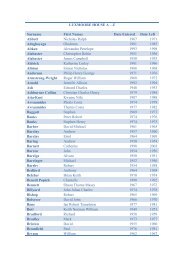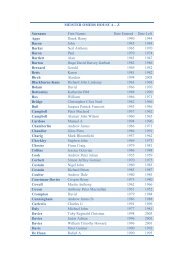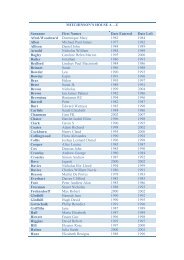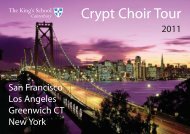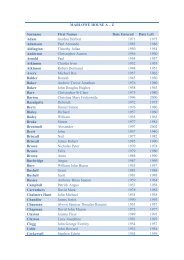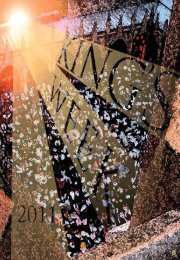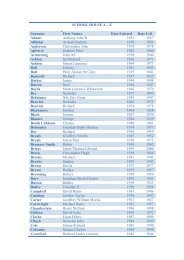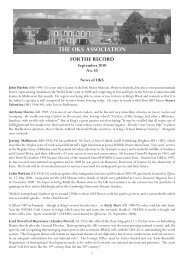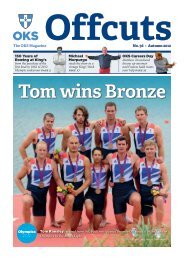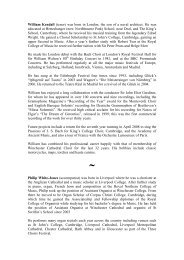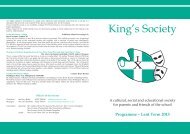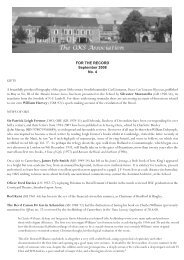January 2011 offcuts_Jan Offcuts 2010.qxd.qxd - The OKS Association
January 2011 offcuts_Jan Offcuts 2010.qxd.qxd - The OKS Association
January 2011 offcuts_Jan Offcuts 2010.qxd.qxd - The OKS Association
Create successful ePaper yourself
Turn your PDF publications into a flip-book with our unique Google optimized e-Paper software.
THE WORKING CLASSES<br />
As a TV Producer part of my job is coming<br />
up with new ideas. This year’s most<br />
controversial was <strong>The</strong> Day <strong>The</strong> Immigrants<br />
Left which was shown on BBC1, presented<br />
by Evan Davies and watched by around six<br />
million people.<br />
I wanted to make a programme about<br />
something that people were talking about.<br />
Immigration is definitely one of the hottest<br />
potatoes in Britain but how to make a<br />
programme about it that anybody wanted<br />
to watch However important it is, once<br />
the news is over, wouldn’t most people<br />
prefer to put their feet up in front of X-<br />
Factor<br />
<strong>The</strong>n it struck me. I’d heard it so many<br />
times: “<strong>The</strong>y’re taking our houses and jobs.<br />
Why don’t they just F... off back home!” I<br />
started to think - what would happen if the<br />
immigrants really did leave I decided to do<br />
something daring - we would conduct a<br />
controversial social experiment, a TV stunt<br />
with a real purpose, where we actually<br />
would take away the immigrants and give<br />
British-born locals the chance to take over<br />
their jobs. Crazy, but it could just work on<br />
TV.<br />
<strong>The</strong> BBC was excited about the idea but<br />
also nervous that it couldn’t be done so it<br />
was my job to prove it could.<br />
We decided to set the programme in<br />
Wisbech, Cambridgeshire, which used to<br />
be one of the most ethnically “English”<br />
towns in Britain until six years ago when<br />
thousands of Eastern European immigrant<br />
workers moved in. Locals now call it<br />
“Wizbekistan”! When the assistant<br />
producer and I went for our first visit we<br />
realised how tough it was going to be to<br />
get people to take part. <strong>The</strong> immigrants<br />
were scared to talk in case they lost their<br />
jobs and the locals had plenty to say about<br />
the subject but were, not surprisingly,<br />
worried about being filmed. We literally<br />
tramped the streets until we had enough<br />
people to make the experiment work. But<br />
with such a controversial subject we always<br />
had to be careful that what we filmed was a<br />
genuine attempt to get every side of the<br />
story.<br />
We obviously couldn’t send away a whole<br />
town of immigrant workers, so we just<br />
targeted a cross section of jobs – croppickers<br />
on a farm, production line workers<br />
in a packing plant, waiting staff and cooks<br />
at the Indian restaurant, etc. and with their<br />
permission we replaced them with our<br />
local British “wannabe” workers. <strong>The</strong>n it<br />
was time for the action to begin.<br />
When it came to the big day the local<br />
workers just seemed to hang themselves.<br />
We’d tried our hardest to find people who<br />
genuinely needed a job and had the kind of<br />
skills that would fit, but in the final<br />
reckoning, they turned up hours late,<br />
others called in sick and those who did<br />
come to work found all kinds of excuses as<br />
to why they weren’t able to keep up with<br />
their fellow (immigrant) workers. <strong>The</strong>y<br />
even accused people of setting up the<br />
conveyor belt too fast (in fact it was slowed<br />
down a bit for their first day), complaining<br />
about being told what to do by a foreigner,<br />
and giving up half-way through the day<br />
because it was too difficult.<br />
When the final show went out, it was a<br />
hugely controversial hit, watched by 6<br />
million people and written about in all the<br />
papers, on the radio, TV and the internet.<br />
<strong>The</strong> most common reaction was “It made<br />
me ashamed to be British”. It wasn’t quite<br />
the result we were expecting but it<br />
certainly made people sit up and think<br />
again about an important subject!<br />
Deborah Colman (GR 1983-85)<br />
(<strong>The</strong> programme Deborah describes went out on<br />
BBC1 Wednesday 24 February 2010).<br />
IS THAT PUBLISHING WELL I’LL BE DAMNED!<br />
<strong>The</strong> publishing bug<br />
<strong>The</strong>re was a certain inevitability that, with<br />
hindsight, I would go into publishing and<br />
become an editor. My father was a Fleet<br />
Street journalist before the war, and I<br />
enjoyed writing small contributions for my<br />
prep school magazine, for <strong>The</strong> Cantuarian<br />
and Richard Branson’s recently started<br />
Student magazine while I was at King’s, and<br />
then decided that Linacre had enough<br />
home-grown talent for me to bring out a<br />
house magazine, Oracle, which I think<br />
managed only two editions, and was run<br />
off on a spirit duplicator machine in the<br />
staff common room. I have no idea how the<br />
machine worked, but you had to generate a<br />
master copy of each page that was<br />
transferred to blank sheets of paper, as you<br />
cranked a handle, by the use of a liquid that<br />
smelt like meths. <strong>The</strong> master copy had a<br />
limited life, but could manage many more<br />
copies of Oracle than I could ever hope to<br />
circulate. However, the excitement of<br />
having an idea for a publication,<br />
commissioning contributors for it, and<br />
witnessing the mechanics of going into<br />
print, confirmed for me my love of<br />
publishing.<br />
At university I got involved in the college<br />
magazine straightaway, being offered the<br />
editorship in my second year. <strong>The</strong>re was<br />
the added attraction that, instead of having<br />
to move out into digs, a room in college<br />
came with the job. However, I probably<br />
have the dubious distinction of being<br />
responsible for an upheaval in the college’s<br />
magazine output. I wanted to produce a<br />
publication that had a mix of literary<br />
creativity and journalistic treatment of<br />
stories and issues of topical relevance, and<br />
decided that a record of how the (talented<br />
and enthusiastic) sports teams and leisure<br />
activity clubs had fared through the year<br />
would sit uncomfortably with this approach<br />
– and so left them out. <strong>The</strong>re were<br />
complaints, inevitably, but eventually all<br />
this information found a place in<br />
subsequent official college magazines,<br />
glossily and professionally produced and<br />
very different animals from the scruffy<br />
<strong>OKS</strong> <strong>Offcuts</strong> • <strong>Jan</strong> <strong>2011</strong> • Issue 31<br />
8<br />
<strong>The</strong> <strong>OKS</strong> <strong>Association</strong> • www.oks.org.uk


